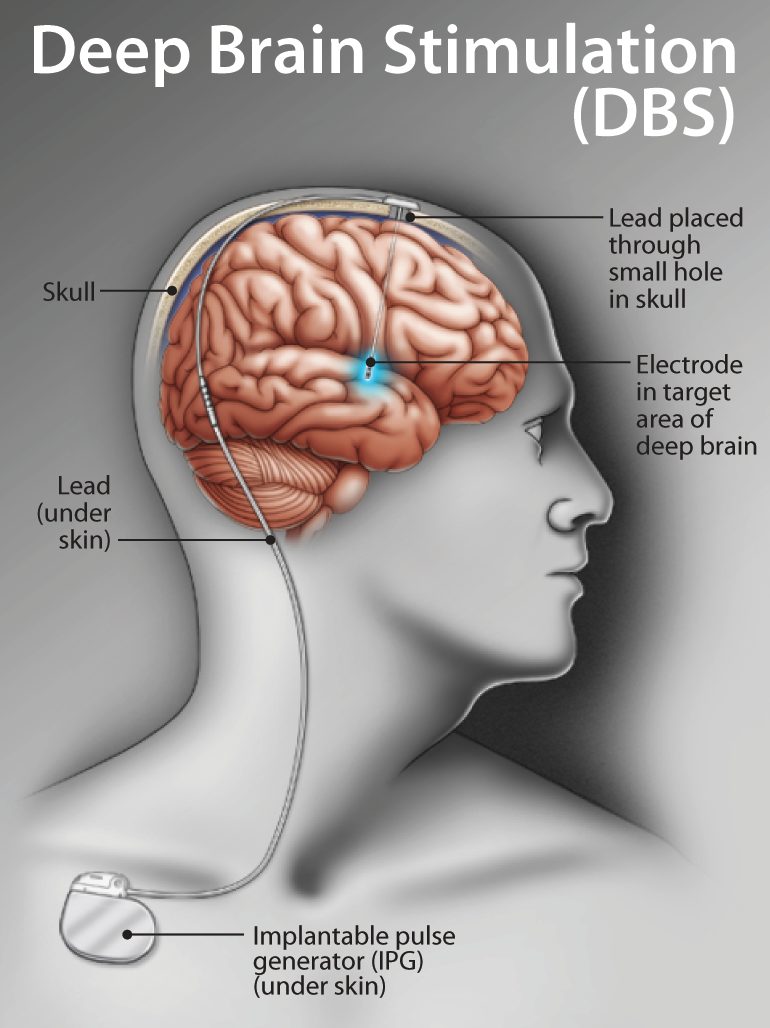Deep Brain Stimulation Surgery for Parkinson’s & Dystonia
The fundamental principle behind DBS lies in its ability to regulate dysfunctional neural circuits. Neurological disorders often result from aberrant patterns of neuronal firing within the brain. DBS works by interrupting these faulty signals, essentially “resetting“ the brain’s activity to alleviate symptoms. Unlike traditional treatments that rely on medication or therapy, DBS offers a targeted approach with remarkable precision and minimal side effects.
Conditions Treated by Deep Brain Stimulation (DBS) Therapy
Deep Brain Stimulation (DBS) is primarily used to treat several neurological conditions, including:
Parkinson’s Disease: DBS is commonly used to alleviate symptoms such as tremors, rigidity, and bradykinesia (slowness of movement) in individuals with Parkinson’s disease, particularly those who have not responded well to medication or have experienced medication-related side effects.
Essential Tremor: DBS is an effective treatment for essential tremor, a neurological disorder characterized by uncontrollable shaking, usually in the hands, head, or voice. DBS can significantly reduce or eliminate tremors, improving quality of life for patients with this condition.
Dystonia: DBS is used to manage symptoms of dystonia, a movement disorder characterized by involuntary muscle contractions that cause repetitive or twisting movements and abnormal postures. DBS can help alleviate muscle spasms and improve motor function in individuals with dystonia.
Obsessive-Compulsive Disorder (OCD): DBS is being explored as a potential treatment option for severe, treatment-resistant OCD. It involves stimulating specific brain regions to modulate neural activity and alleviate obsessive thoughts and compulsive behaviors.
Epilepsy: DBS is under investigation as a treatment for epilepsy, particularly in individuals who do not respond to traditional anti-seizure medications or are not suitable candidates for epilepsy surgery. DBS aims to reduce seizure frequency and severity by modulating abnormal brain activity.
Depression: DBS is being studied as a treatment for severe, treatment-resistant depression. By targeting specific brain regions involved in mood regulation, DBS may help alleviate depressive symptoms and improve overall mental health.
While DBS has shown promising results in managing these conditions, it’s essential for patients to undergo thorough evaluations and consultations with healthcare providers to determine if they are suitable candidates for DBS therapy. Additionally, ongoing monitoring and adjustment of DBS settings may be necessary to optimize therapeutic outcomes and minimize side effects.
Services
Discover personalized and advanced treatment options under the expert care of Dr. Jaslovleen Sidhu, a renowned neurologist specializing in movement disorders.
Having a query?
Whether you seek insights into a specific medical condition, guidance on preventive care, or simply wish to optimize your well-being.

What to expect
Symptom Improvement:
- Reduction of Motor Symptoms: DBS therapy aims to alleviate symptoms such as tremors, rigidity, and bradykinesia in conditions like Parkinson’s disease, essential tremor, and dystonia. Many patients experience significant improvement in motor function and overall quality of life.
- Enhanced Control: DBS can provide greater control over involuntary movements and muscle spasms, allowing individuals to perform daily activities more comfortably and independently.
Customized Treatment:
- Personalized Programming: The neurostimulator settings can be adjusted to tailor the treatment to each patient’s specific needs. Healthcare providers work closely with patients to optimize stimulation parameters and minimize side effects.
- Long-Term Management: DBS therapy requires ongoing monitoring and adjustments to ensure optimal symptom control. Regular follow-up appointments are essential for assessing treatment efficacy and addressing any concerns.
Quality of Life Enhancement:
- Improved Daily Functioning: By reducing symptoms and enhancing motor function, DBS therapy can improve patients’ ability to engage in activities of daily living, maintain independence, and participate in social and recreational activities.
- Emotional Well-Being: Many patients report improvements in mood, cognition, and overall well-being following DBS therapy, leading to a more positive outlook on life.
Risks and Considerations of Deep Brain Stimulation (DBS) Therapy
Surgical Risks:
- Infection: There is a risk of infection at the surgical site or around the implanted hardware, which may require additional treatment or device removal.
- Bleeding or Hemorrhage: In rare cases, DBS surgery may lead to bleeding inside the brain, which can result in neurological complications or require emergency intervention.
Device-related Risks:
- Hardware Malfunction: The neurostimulator or electrode leads may malfunction over time, necessitating device replacement or repair.
- Lead Migration or Fracture: Electrode leads may shift position or break, affecting treatment efficacy and requiring surgical revision.
Side Effects:
- Speech or Language Problems: DBS therapy may cause temporary or permanent changes in speech or language abilities, particularly if the electrodes are placed near speech-related brain regions.
- Cognitive Changes: Some patients may experience cognitive side effects, such as memory problems, difficulty concentrating, or changes in personality, although these are often temporary and resolve with adjustments to stimulation settings.
Psychosocial Considerations:
- Adjustment Period: It may take time for patients to adjust to DBS therapy and achieve optimal symptom control. Patience and persistence are essential during the initial phases of treatment.
- Support Network: Having a strong support system of family, friends, and healthcare professionals can help patients navigate the challenges and uncertainties associated with DBS therapy.



